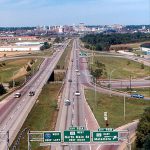Congress’s transportation problems (and projects)
Congress is currently facing a tempest of transportation issues. First and foremost is the impending budget deadline, fast approaching on May 31, but there are other looming problems and projects, too, including regulatory agency vacancies that are drawing attention to transportation safety, as well as renewed efforts to reinstate Amtrak service between New Orleans and Orlando.

With Congress readying itself for a bruising 2016 election season, Capitol Hill has transportation funding on its mind. Image from Nicolas Raymond.
Perhaps most significant right now is the budget deadline. As we’ve previously reported, the gas tax has been the primary source for funding the federal transportation budget, but with today’s fuel-efficient cars — and lawmakers’ hesitation to raise the gas tax — it is simply not covering costs. (The federal government spends, on average, $50 billion each year on transportation projects, but the gas tax covers only about $34 billion.)
As The Hill reports, “Lawmakers have turned to other areas of the federal budget in recent years to make up the difference, but the short-term solutions have resulted in Congress approving only a series of temporary infrastructure funding patches since a 2005 transportation bill expired in 2009, including an $11 billion 2014 measure that is now scheduled to expire on May 31.”
Aside from raising the gas tax, another strategy known as repatriation would tax overseas corporate revenue to fund new road projects. That proposal, however, “has gone nowhere” in the Republican-controlled Congress. “Rather than raise the federal gas tax, a better policy would be to repeal the federal tax and let states pay for their own road projects,” Heritage Action, a conservative advocacy group, argues. “Devolving transportation projects back to the states will ensure that gas tax money is used for the highest value-added projects.”
Aside from the budget impasse, another transportation question are the current number of vacant positions at transportation regulatory agencies — including the Federal Railroad Administration, the Federal Transit Administration, the Federal Motor Carrier Safety Administration, the Pipeline and Hazardous Materials Safety Administration, and the Transportation Security Administration — which are now being filled with interim officials. Filling the vacant positions will all require the Senate’s confirmation.
The vacancies highlight recent safety issues. “A recent spate of accidents involving commuter, subway and oil trains have raised awareness about the number of vacancies atop the federal government’s transportation watchdogs,” reports The Hill. “The interim transportation chiefs have been put to the test this year with accidents involving Amtrak, commuter railways in New York and Chicago and the Washington, D.C. Metrorail subway system. Oil trains have been in the spotlight as well as lawmakers push for regulatory changes to prevent explosive crashes like recent accidents in North Dakota and Canada.”
Yet while the open positions might draw attention to these issues, they are not necessarily causing them, points out Joshua Schank, president of the non-partisan Eno Center for Transportation. “The system is overwhelmingly safe, so it’s difficult to draw correlations between vacancies at the U.S. DOT and accidents that have happened because there are so few data points,” he told The Hill. However, he notes, the vacant roles do raise “questions about whether there are too many regulatory agencies within the U.S. DOT.”
There are forward-moving projects on the horizon, too. Congress recently approved a bipartisan bill to fund a study exploring whether restoring Amtrak service between Orlando and New Orleans would be feasible. Publicly funded Amtrak had run rail service in the area before Hurricane Katrina, but service has not been reinstated since the storm hit almost 10 years ago, though the rails have since been repaired.
U.S. Rep. Gwen Graham said that the feasibility study is necessary for improving both business and mobility in the area. “Since Hurricane Katrina, Northwest Florida has been the only region in our state without access to national passenger rail,” Graham said. “New service from Orlando to New Orleans has the potential to create jobs and economic growth in our community. This study is an important first step in determining if passenger rail should return.”
Related Posts
Category: Legislation, Transportation

















